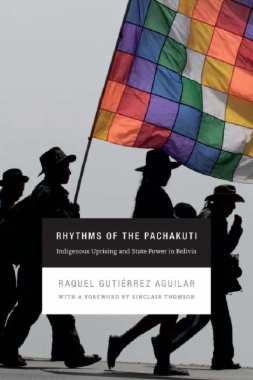In the indigenous Andean language of Aymara, pachakuti refers to the subversion and transformation of social relations. Between 2000 and 2005, Bolivia was radically transformed by a series of popular indigenous uprisings against the country's neoliberal and antidemocratic policies. In Rhythms of the Pachakuti, Raquel Gutiérrez Aguilar documents these mass collective actions, tracing the internal dynamics of such disruptions to consider how motivation and execution incite political change.
"In Rhythms of the Pachakuti we can sense the reverberations of an extraordinary historical process that took place in Bolivia at the start of the twenty-first century. The book is the product of Raquel Gutiérrez Aguilar's political engagement in that historical process. . . . Though of Mexican nationality, [she] was intimately involved in Bolivian politics for many years and acquired a quasi-legendary status there as an intense, brilliant activist and radical intellectual. . . . [Her account is] . . . itself a revolutionary document. . . . Rhythms of the Pachakuti deserves to stand as a key text in the international literature of radicalism and emancipatory politics in the new century."—Sinclair Thomson, from the foreword
- Contents
- Foreword: Beyond the Old Order of Things, Sinclair Thomson
- Preface
- Acknowledgments
- Part I. Community Uprisings and Grassroots Democratization
- Chapter 1. The Coalition for the Defense of Water and Life: The Massive Public Defiance of State Order
- Chapter 2. Aymara Roadblocks in La Paz: Community as a Mobilizing Force
- Chapter 3. The Disputed Territories of the Chapare: The Coca Growers’ Struggles from 2000 to 2003
- Part II. From Governmental Collapse to Pachakuti’s Suspension, 2003–2005
- Chapter 4. Insurgent Politics: The Rebellious Year of 2003
- Chapter 5. Compromises and “Catastrophic Balance”: The Confusing Year of 2004
- Chapter 6. The Growing Tension between Emancipation, Autonomy, Self-Governance, and State Reconstitution in 2005
- Conclusion: Final Reflections
- Appendix 1: Methodological Approach
- Appendix 2: Positions of the Three Most Important Social Voices
- Notes
- References
- Index

